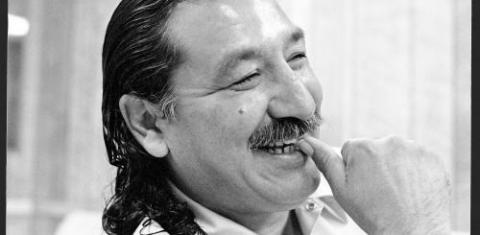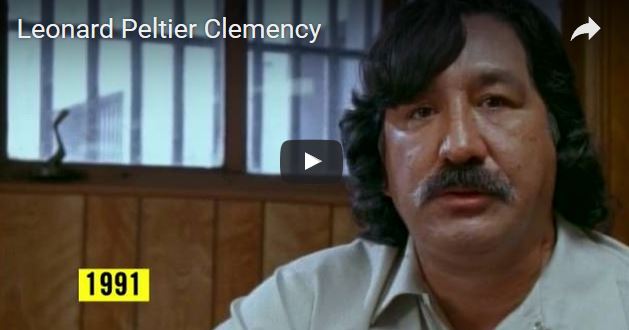- Amnesty International USA Urges President Obama to Grant Clemency to Leonard Peltier With New Advocacy Video
- Take Action - Sign Letter to President Obama
- Quick Facts - Case Of Leonard Peltier
To mark his 72nd birthday today [September 12, 2016], Amnesty International USA (AIUSA) released a new video urging President Obama to grant clemency to Anishinabe-Lakota Native American activist Leonard Peltier before leaving office. The video highlights Amnesty International's human rights concerns about Peltier's case and is narrated by actor Peter Coyote. Amnesty International has joined Indigenous activists, human and civil rights groups, and Peltier's family and friends to call for his release.
The full video is at: https://www.youtube.com/watch?v=QAx2djDvrCU
Peltier has been imprisoned for 40 years serving two consecutive life sentences, despite the fact that the legal processes surrounding his extradition, conviction, and post-conviction have been riddled with flaws. Amnesty International and legal experts who have studied the case have raised serious concerns about his conviction. In the years since, Peltier has repeatedly been denied parole and exhausted all of this legal remedies, despite evidence of coerced testimony and withholding of key ballistics evidence at trial. Peltier is now 72 years old and in poor health.
"The moment for action is decades overdue in this case. Leonard Peltier is 72 and in failing health. As President Obama approaches his last few months in office and continues to announce record-breaking numbers of commutations, it is crucial that he grant Leonard Peltier clemency. Despite the political factors which may have influenced the way the case was prosecuted, Leonard Peltier has remained in prison all these years. He is not eligible for parole again until 2024," said Zeke Johnson, Managing Director, Individuals at Risk program. "President Obama now has the opportunity to bring some measure of closure to a case that has troubled many people for decades."
When arrested, Peltier was a leading member of the American Indian Movement (AIM), an activist group involved in promoting the rights of Indigenous people during a period of intense conflict in the 1970s. In 1975, during a confrontation involving AIM members, two FBI agents were shot dead. In the two years prior to the confrontation in which the two FBI agents were killed, more than 60 Native Americans on the Pine Ridge reservation had been killed - allegedly by paramilitary squads connected to the tribal government - without anyone being brought to justice for these crimes.
Amnesty International USA has chosen Peltier's case as one of 12 cases for the organization's annual Write for Rights event, the world's largest human rights letter writing event. Every year, culminating around Human Rights Day on December 10th, Amnesty International organizes hundreds of thousands of people worldwide to write letters on behalf of people at risk of human rights violations.
Listen here.
Your Message
Message Recipients: Barack Obama - President, Robert A. Zauzmer - Acting US Pardon Attorney
Subject: Free Leonard Peltier
I am writing to urge you to grant Leonard Peltier's application for clemency on humanitarian grounds and in the interests of justice.
I acknowledge that Leonard Peltier was convicted of a serious crime. I have tremendous sympathy for the relatives of Ronald Williams and Jack Coler. They have the right to justice.
I also share Amnesty International's serious concerns about the fairness of the proceedings leading to Leonard Peltier's trial and the evidence on which his conviction was based. Parole examiners have thus far failed to take account of the mitigating factors in the case.
Amnesty is concerned about coercion of an alleged eye-witness who said she had seen Leonard Peltier shoot the agents, but who later retracted her testimony, and who was not allowed to be called as a defense witness at his trial. Amnesty has further concerns about the evidence linking Leonard Peltier to the shootings as well as the prosecution's withholding of evidence that might have assisted Leonard Peltier's defense, including potentially key ballistics evidence.
Given that all available remedies have been exhausted; that Leonard Peltier's next parole hearing is scheduled for 2024; and that Leonard Peltier has spent 40 years in prison, the interests of justice would best be served by releasing Leonard Peltier from prison.
I am also very concerned by reports of Leonard Peltier's deteriorating health. I urge you to ensure that he is given access to appropriate medical treatment and is moved to a facility that can address his medical needs as a matter of urgency until he is granted release.
Sign here.
- Leonard Peltier is an imprisoned Native American considered by Amnesty International, the Southern Christian Leadership Conference, National Congress of American Indians, the Robert F. Kennedy Memorial Center for Human Rights, Archbishop Desmond Tutu and Rev. Jesse Jackson, among many others, to be a political prisoner who should be immediately released.
- Leonard Peltier was convicted for the deaths of two FBI agents who died during a 1975 shoot-out on the Pine Ridge Indian Reservation. Mr. Peltier has been in prison for over 29 years.
- The Wounded Knee occupation of 1973 marked the beginning of a three-year period of political violence on the Pine Ridge Indian Reservation. The tribal chairman hired vigilantes, self titled as "GOONS," to rid the reservation of American Indian Movement (AIM) activity and sentiment. More than 60 traditional tribal members and AIM members were murdered and scores more were assaulted. Evidence indicated GOON responsibility in the majority of crimes but despite a large FBI presence, nothing was done to stop the violence. The FBI supplied the GOONS with intelligence on AIM members and looked away as GOONS committed crimes. One former GOON member reported that the FBI supplied him with armor piercing ammunition.
- Leonard Peltier was an AIM leader and was asked by traditional people at Pine Ridge, South Dakota, to support and protect the traditional people being targeted for violence. Mr. Peltier and a small group of young AIM members set up camp on a ranch owned by the traditional Jumping Bull family.
- On June 26, 1975 two FBI agents in unmarked cars followed a pick-up truck onto the Jumping Bull ranch. The families immediately became alarmed and feared an attack. Shots were heard and a shoot-out erupted. More than 150 agents, GOONS, and law enforcement surrounded the ranch.
- When the shoot-out ended the two FBI agents and one Native American lay dead. The agents were injured in the shoot-out and were then shot at close range. The Native American, Joseph Stuntz, was shot in the head by a sniper's bullet. Mr. Stuntz's death has never been investigated, nor has anyone ever been charged in connection with his death.
- According to FBI documents, more than 40 Native Americans participated in the gunfight, but only AIM members Bob Robideau, Darrell Butler, and Leonard Peltier were brought to trial.
- Mr. Robideau and Mr. Butler were arrested first and went to trial. A federal jury in Iowa acquitted them on grounds of self-defense, finding that their participation in the shoot-out was justified given the climate of fear that existed on the Pine Ridge Reservation. Further, they could not be tied to the close-range shootings.
- Leonard Peltier was arrested in Canada on February 6, 1976, along with Frank Blackhorse, a.k.a. Frank Deluca. The United States presented the Canadian court with affidavits signed by Myrtle Poor Bear who said she was Mr. Peltier's girlfriend and allegedly saw him shoot the agents. In fact, Ms. Poor Bear had never met Mr. Peltier and was not present during the shoot-out. Soon after, Ms. Poor Bear recanted her statements and said the FBI threatened her and coerced her into signing the affidavits.
- Mr. Peltier was extradited to the United States where he was tried in 1977. The trial was held in North Dakota before United States District Judge Paul Benson, a conservative jurist appointed to the federal bench by Richard M. Nixon. Key witnesses like Myrtle Poor Bear were not allowed to testify and unlike the Robideau/Butler trial in Iowa, evidence regarding violence on Pine Ridge was severely restricted.
- An FBI agent who had previously testified that the agents followed a pick-up truck onto the scene, a vehicle that could not be tied to Mr. Peltier, changed his account, stating that the agents had followed a red and white van onto the scene, a vehicle which Mr. Peltier drove occasionally.
- Three teenaged Native witnesses testified against Mr. Peltier, they all later admitted that the FBI forced them to testify. Still, not one witness identified Mr. Peltier as the shooter.
- The U.S. Attorney prosecuting the case claimed that the government had provided the defense with all FBI documents concerning the case. To the contrary, more than 140,000 pages had been withheld in their entirety.
- An FBI ballistics expert testified that a casing found near the agents' bodies matched the gun tied to Mr. Peltier. However, a ballistic test proving that the casing did not come from the gun tied to Mr. Peltier was intentionally concealed.
- The jury, unaware of the aforementioned facts, found Mr. Peltier guilty. Judge Benson, in turn, sentenced Mr. Peltier to two consecutive life terms.
- Following the discovery of new evidence obtained through a Freedom of Information Act lawsuit, Mr. Peltier sought a new trial. The Eighth Circuit ruled, "There is a possibility that the jury would have acquitted Leonard Peltier had the records and data improperly withheld from the defense been available to him in order to better exploit and reinforce the inconsistencies casting strong doubts upon the government's case." Yet, the court denied Mr. Peltier a new trial.
- During oral argument, the government attorney conceded that the government does not know who shot the agents, stating that Mr. Peltier is equally guilty whether he shot the agents at point-blank range, or participated in the shoot-out from a distance. Mr. Peltier's co-defendants participated in the shoot-out from a distance, but were acquitted.
- Judge Heaney, who authored the decision denying a new trial, has since voiced firm support for Mr. Peltier's release, stating that the FBI used improper tactics to convict Mr. Peltier, the FBI was equally responsible for the shoot-out, and that Mr. Peltier's release would promote healing with Native Americans.
- Mr. Peltier has served over 29 years in prison and is long overdue for parole. He has received several human rights awards for his good deeds from behind bars which include annual gift drives for the children of Pine Ridge, fund raisers for battered women's shelters, and donations of his paintings to Native American recovery programs.
- Mr. Peltier suffers from diabetes, high blood pressure, and a heart condition. Time for justice is short.
- Currently, Mr. Peltier's attorneys have filed a new round of Freedom of Information Act requests with FBI Headquarters and all FBI field offices in an attempt to secure the release of all files relating to Mr. Peltier and the RESMURS investigation. To date, the FBI has engaged in a number of dilatory tactics in order to avoid the processing of these requests.
[Michael Kuzma is an attorney based in Buffalo, New York, and a member of Leonard Peltier's Legal Team. Since 2001, he has been spearheading efforts to secure files under the Freedom of Information Act (FOIA) from the FBI relating to Leonard Peltier and the RESMURS investigation.
This site was developed to ensure that those involved in the struggle to gain Leonard Peltier's liberation from prison have a place to which they may turn for the most current and accurate information relating to the case.]



Spread the word